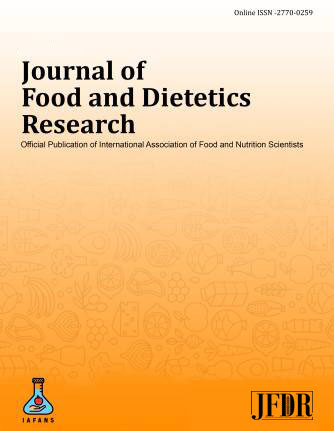Content Analysis of Textbooks of Primary Schools of the Government of Khyber Pakhtunkhwa for Nutrition-Related Topics – A Qualitative Study from KP Province of Pakistan
DOI:
https://doi.org/10.48165/jfdr.2025.5.1.2Keywords:
nutrition education, primary education curricula, pedagogy, government of Khyber-Pakhtunkhwa, Higher education Department (HED)Abstract
This paper discusses how nutrition-related topics are represented in textbooks used by the primary school-going children of the government schools of Khyber Pakhtunkhwa (KP), Pakistan. Recognizing the important role nutrition education plays in promoting healthy lifestyles and preventing malnutrition, this study aims to evaluate the adequacy, accuracy, and integration of nutrition-related concepts within the school curriculum. A qualitative content analysis was done on textbooks of key subjects Science, Mathematics, Social Studies, and Urdu across Grades 1 to 5. The content analysis was to identify the coverage of essential topics on nutrition including food groups, essential nutrients, hygiene, malnutrition, and dietary habits, and assess the systematic introduction and reinforcement of the concepts across various grade levels and subjects. Results suggest that while concepts of basic nutrition are well integrated into the curriculum, gaps lie in the aspects of depth, consistency, and practical application. The most serious issues identified were the low inclusion of micronutrients and malnutrition; subject integration is broken up, interaction and real-life applications are weak, and content is not adequately contextualized in relation to local dietary practices. These gaps reduce the effectiveness of nutrition education in equipping students with the knowledge and skills necessary to make informed dietary choices. This study underscores the need for curriculum improvements to ensure a more comprehensive and structured approach to nutrition education. It suggests greater interdisciplinary integration, inclusion of practical learning activities, and incorporation of culturally relevant dietary examples to enhance students' understanding and application of nutrition knowledge. Improving nutrition education at the primary level can be beneficial in the long run to address malnutrition and improve dietary habits among the future generations in KP.
Downloads
References
Cusquisibán-Alcantara, Y., Toledo-Garrido, C., Calizaya-Milla, Y. E., Carranza-Cubas, S. P., & Saintila, J. (2024). Impact of a Nutrition Education Intervention on Knowledge, Healthy Eating Index, and Biochemical Profile in a Rural Community in Peru. Journal of Multidisciplinary Healthcare, 1111-1125.
Abid, J., Alam, I., Ahmad, A. M. R., Saeed, R. F., & Farooq, U. (2024). Dietary Inflammatory Potential of Mediterranean Diet Versus A Typical Traditional Pakistani Diet.
Alam, I., Gul, R., Chong, J., Tan, C.T.Y., Chin, H.X., Wong, G., Doggui, R. and Larbi, A. (2019). Recurrent circadian fasting (RCF) improves blood pressure, biomarkers of cardiomet abolic risk and regulates inflammation in men. Journal of translational medicine, 17, pp.1-29.
Alam, I., Ali, M. and Farooq, M. (2022). Assessment of healthy eating and active lifestyle on campus environment in a univer sity setting as perceived by students using the innovative photo voice method, a healthy eating and active lifestyle (HEAL) study. Journal of Innovative Sciences, 8(1), pp.113-123.
Alam, I. (2013). Relationship between nutritional status and immune functions in elderly Pakistani men (Doctoral disser tation, Dissertation, Tübingen, Universität Tübingen, 2013).
Alam, I., Alam, I., Paracha, P.I. and Pawelec, G. (2012a). Higher estimates of daily dietary net endogenous acid produc tion (NEAP) in the elderly as compared to the young in a healthy, free-living elderly population of Pakistan. Clinical Interventions in Aging, pp.565-573.
Alam, I., Larbi, A. and Pawelec, G. (2012b). Nutritional status influences peripheral immune cell phenotypes in healthy men in rural Pakistan. Immunity & Ageing, 9, pp.1-10.
Alam, I., Shivappa, N., Hebert, J.R., Pawelec, G. and Larbi, A. (2018). Relationships between the inflammatory potential of the diet, aging and anthropometric measurements in a cross-sectional study in Pakistan. Nutrition and healthy aging, 4(4), pp.335-343.
Almajwal, A.M., Alam, I., Abulmeaty, M., Razak, S., Pawelec, G. and Alam, W. (2020). Intake of dietary advanced glycation end products influences inflammatory markers, immune phenotypes, and antiradical capacity of healthy elderly in a little‐studied population. Food science & nutrition, 8(2), pp.1046-1057.
Jan, A., Shah, S.S., Almajwal, A.M. and Alam, I. (2023). Stakeholders’ Identification and Understanding of the Multisectoral Governance for Child and Maternal Nutrition During the MDGs Period – A Stakeholders’ Network Analysis of Khyber Pakhtunkhwa Province of Pakistan, 01 November 2023, PREPRINT (Version 1) available at Research Square [https://doi.org/10.21203/rs.3.rs-3331937/v1]
Almasa, R. D. (2025). The role of stressors and supports in early childhood education instructional quality. Social Sciences & Humanities Open, 11, 101233.
Nisar, M., & Din, M. N. U. (2025). Curriculum And Competence: Evaluating Pakistan's Educational Framework Against Global Standards. Journal of Religion and Society, 3(01), 159-167.
Bischoff, S. C., Boirie, Y., Cederholm, T., Chourdakis, M., Cuerda, C., Delzenne, N. M., ... & Barazzoni, R. (2017). Towards a multidisciplinary approach to understand and manage obesity and related diseases. Clinical nutrition, 36(4), 917-938.
Fanzo, J., & Davis, C. (2021). Global food systems, diets, and nutrition. Cham: Springer International Publishing.
Mitra, S., Cavalleri, S., Anderson, S., Kumar, R. S., & Ray, S. (2024). Sustainable Resourcing for All in Food & Nutrition Security: Creative solutions for healthy & resilient populations–Proceedings of the 9th annual International Summit on Nutrition and Health.
Moats, S., & Olson, S. (Eds.). (2013). Nutrition education in the K-12 curriculum: the role of national standards: workshop summary. National Academies Press.




